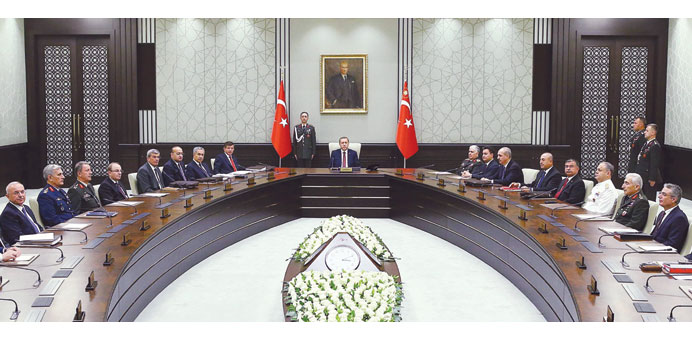A handout picture taken and released on June 29 by the Turkish Presidential Palace Press Office shows Turkey’s President Tayyip Erdogan heading the National Security Council meeting in Ankara. Erdogan chaired a top security meeting as media speculated that Ankara was planning a military intervention in Syria, following gains there by Kurds against the Islamic State militants.
By Shabtai Gold/DPA/Istanbul
The recent advances by Kurdish militias in northern Syria, seizing key territories from the Islamic State extremist group, have spooked Turkey, which has amassed troops and tanks along its border with its embattled neighbour.
Ankara worries the gains will fuel nationalist sentiment among its own Kurdish minority at home, according to analysts.
It is also panicked that changes along the border with will cut off supply lines to the Syrian rebel groups it supports in Aleppo, just as those forces launch an offensive in the city against President Bashar al-Assad’s troops.
The Kurdish fighters are the US’ most reliable ally on the ground in the fight against Islamic State and if Turkey, a Nato ally, were to move against them then already damaged relations with Washington would only get worse.
“There is a big political price to pay if they intervene against the only force that is successful at fighting Islamic State,” says Firas Abi-Ali, an analyst at IHS Country Risk.
Turkey would also have a public relations nightmare explaining why it never acted earlier against Islamic State, which has been based along the border for 18 months. Never mind the potential Turkey would have to get bogged down in a civil war that has no end in sight.
Turkey’s military in recent days has deployed 55,000 troops, in addition to tanks and artillery batteries near the border, according to Turkish media.
Prime Minister Ahmet Davutoglu sought to downplay growing speculation that he was about to send troops over the border into Syria, saying he would only act to protect Turkey’s national security.
“No one should expect Turkey to invade Syria tomorrow or in the short term,” Davutoglu said in a television interview.
Most analysts, noting the numerous risks and reported reservations within the Turkish military, think the government would only intervene in a worst case scenario.
“Turkey is signalling to the international community that it is unhappy with the developments on the ground particularly with regards to the support to the Syrian Kurds,” says Sinan Ulgen, chairman of the Istanbul-based Edam think-tank.
That Turkey needed such a drastic step to get the attention of its allies might be a measure of how low relations with Washington have sunk.
However, the very threat of taking military action may serve as a warning to the Kurdish Peoples’ Protection Units (YPG) and its political chiefs, the PYD, to rein in their ambitions.
The Kurdish advance, with the help of persistent and fierce US-led airstrikes, are aimed at connecting three Kurdish enclaves while depriving Islamic State of its last area along the Turkish border, cutting off supply lines of equipment and jihadi recruits.
Turkey views the PYD as closely linked to its arch-rival, the outlawed Kurdistan Workers’ Party (PKK). President Recep Tayyip Erdogan spoke of Kurdish “terrorists” along the border.
While some Kurdish groups accuse the government of collaborating with Islamic State, Turkey outright denies these charges.
Aaron Stein, a Turkey analyst at the Royal United Services Institute think-tank, says Ankara may have reached a deal with Islamic State in the past, to avoid a direct conflict, but this increasingly looks void.
“The gentlemen’s agreement is starting to fray. Ankara is not a friend of ISIS,” he says, using an acronym for the extremists.
Turkey however has to tread carefully, Stein notes, as acting directly against Islamic State could open the country up to terrorist attacks like the recent slaughter of 38 tourists on a beach in Tunisia.
“You have a Turkey that is almost out of options,” cautions Stein.
Turkey’s dilemmas come amid a new rebel push to take Aleppo, Syria’s second largest city. Intervening would likely irk both the United States, as the rebel alliance includes the Al Qaeda linked Al Nusra Front, and Iran and Russia, the main backers of the regime.
Moreover, the country already hosts 2mn Syrian refugees and has spent $6bn caring for them. Continued fighting would likely mean fresh waves of destitute people seeking safe haven.
“The responsibility to care for these refugees is taxing the public patience and government resources,” write Kemal Kirisci and Sinan Ekim at the Brookings Institute.
Dialogue with the Kurds and the US, to make Turkey’s red lines clear while reaching compromises with the PYD might be the best and only way out of the hole - if Erdogan, an authoritarian-style leader, could tolerate such a step.
Turkey could offer the West help in fighting ISIS in exchange for help with the refugees and a check on the Kurds, says Ulgen about what a potential deal could resemble.
“The deal would be that Turkey would be more forthcoming as partner of the anti-ISIS coalition in return for getting a guarantee from Western partners that PYD will not be supported in their territorial aspirations,” he explains.

